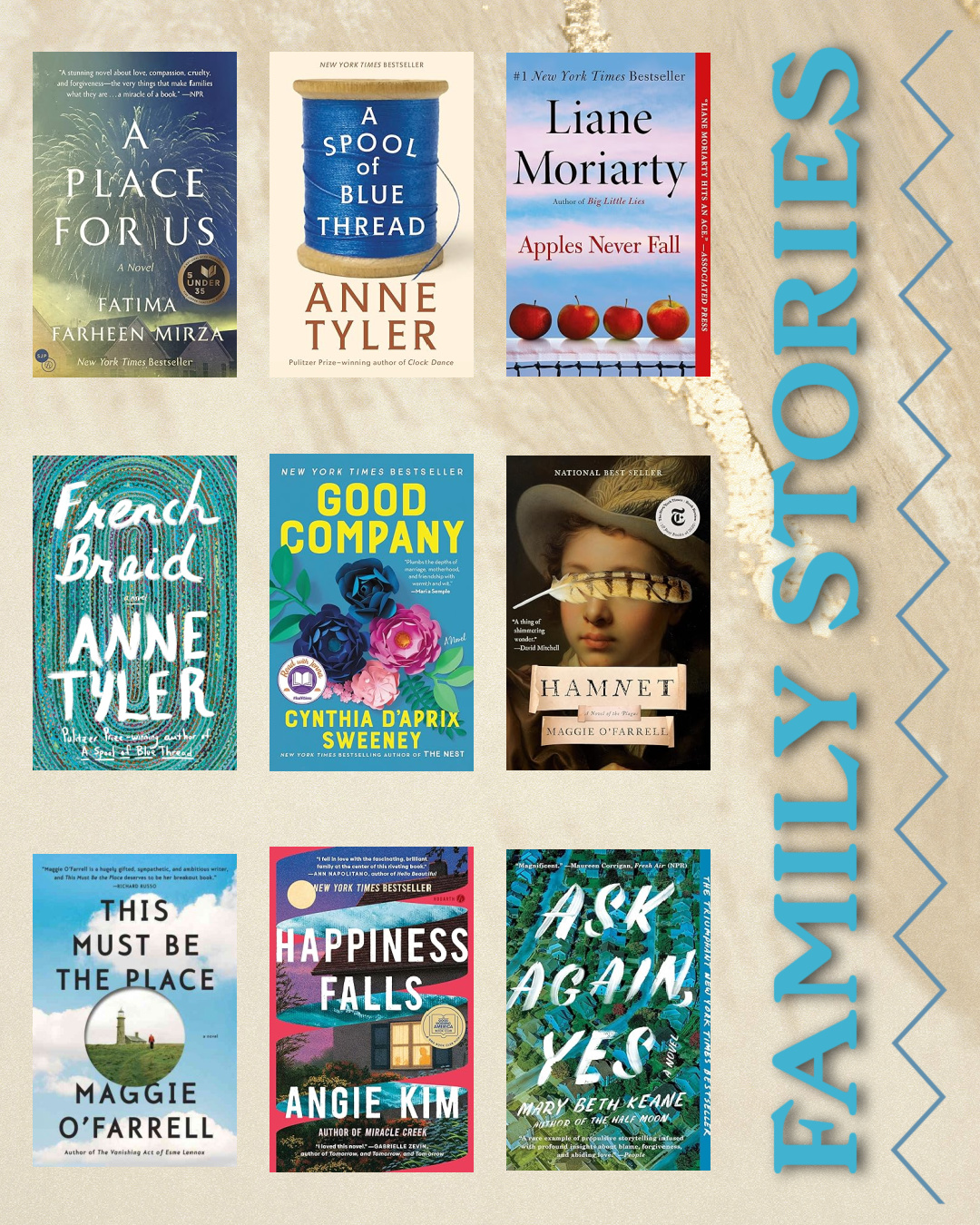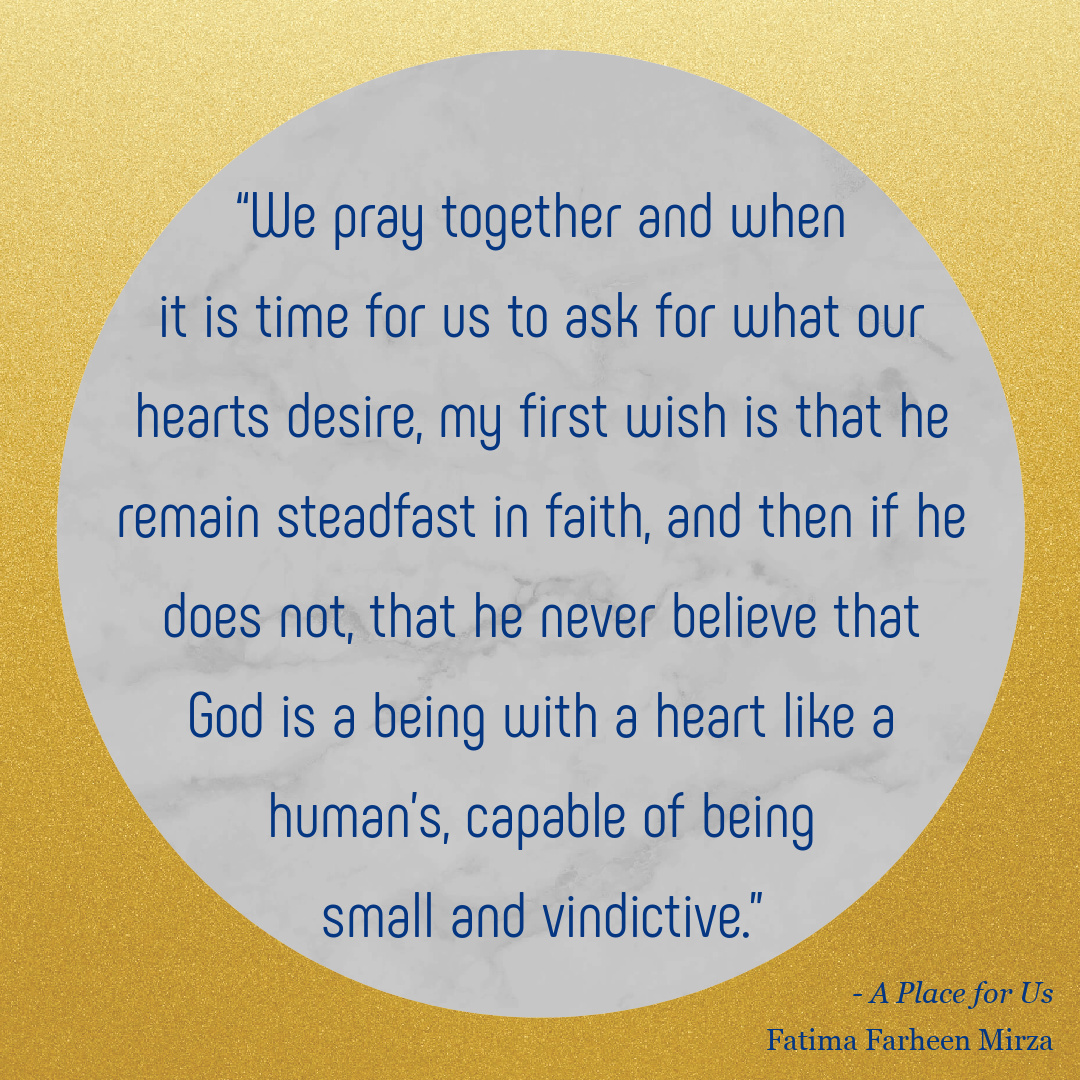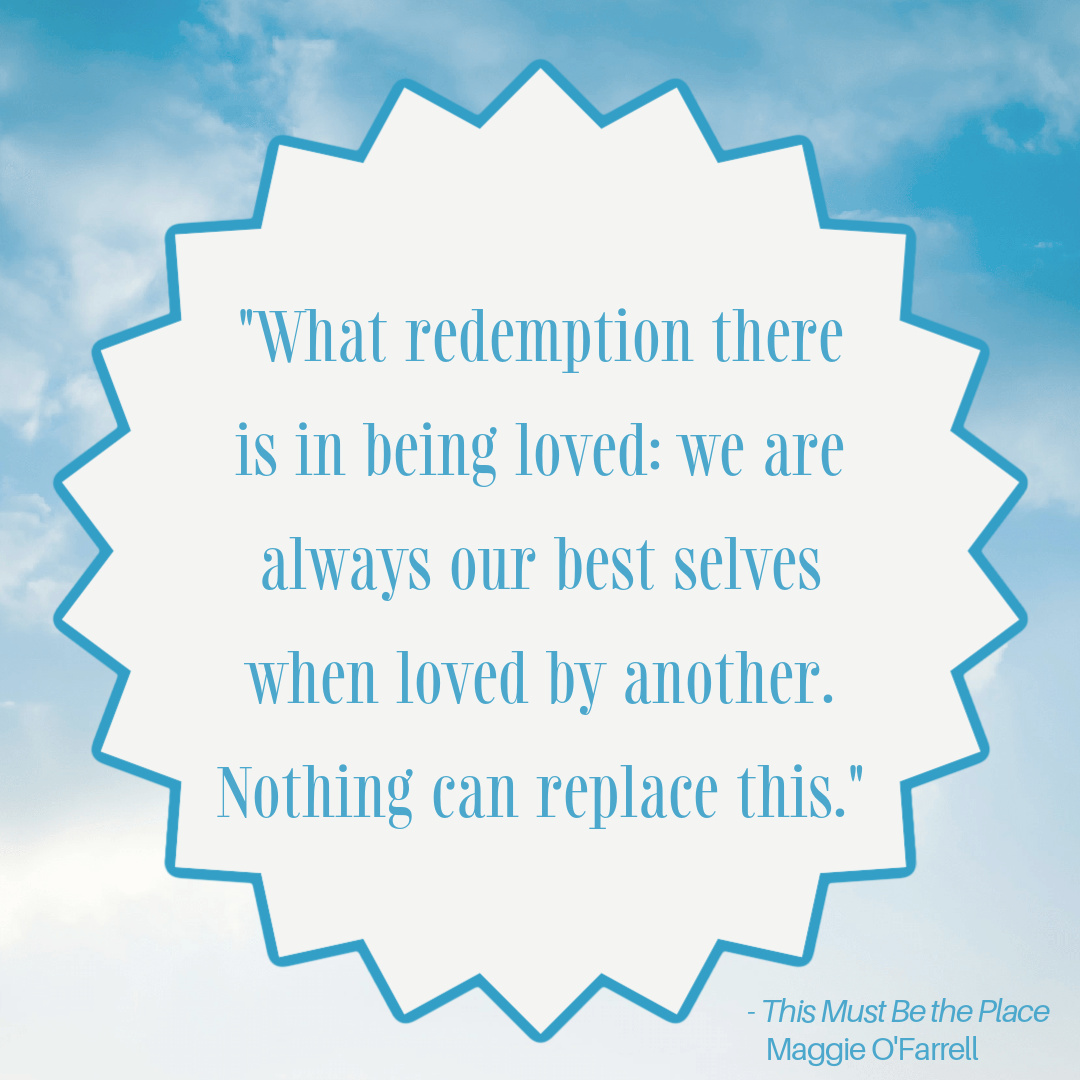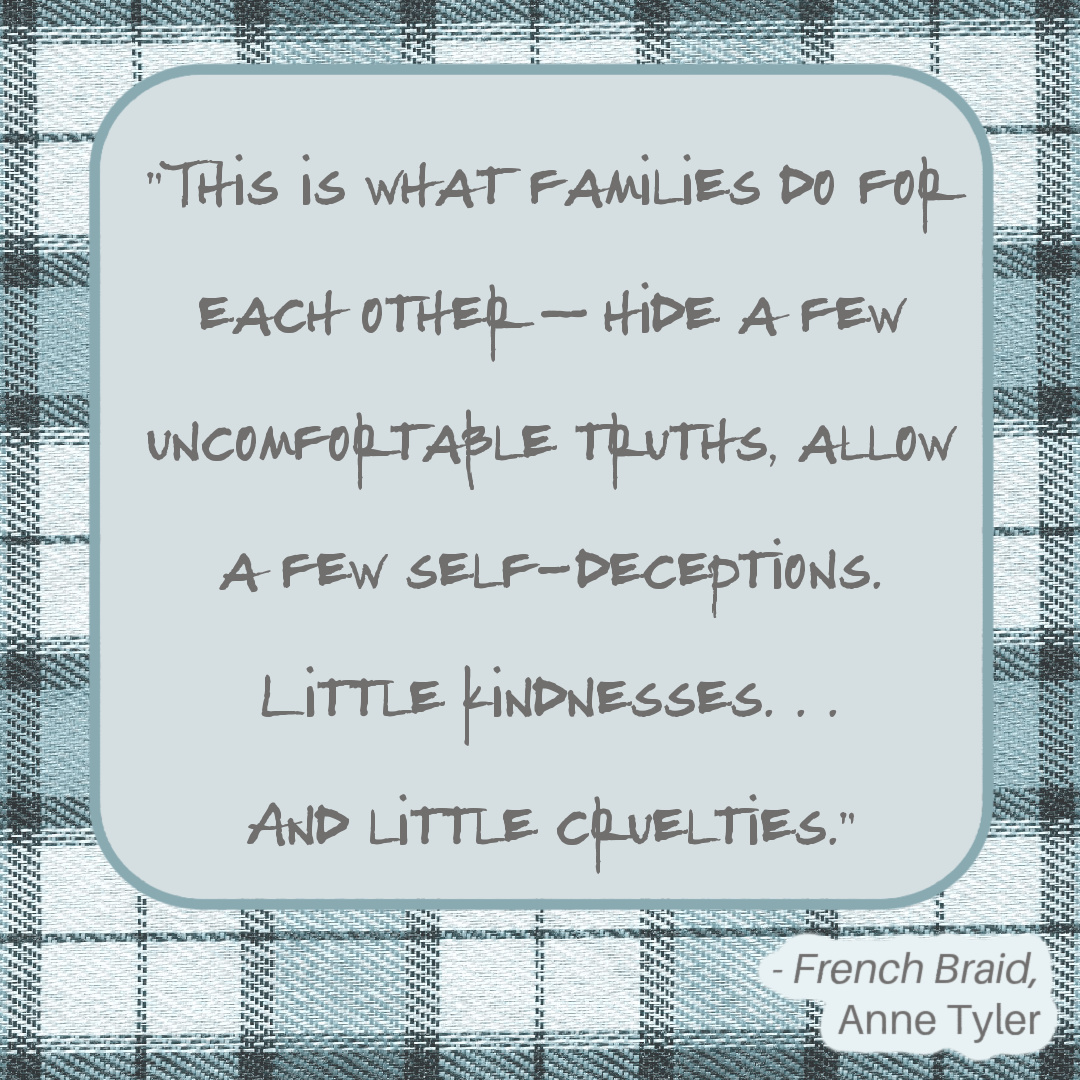We all have families, and our families all have quirks. Fortunately (at least I *think* it’s fortunate), not all of our families are dramatic enough to achieve novel-worthy status. But that’s not to say we don’t love reading about families who DO make that cut, because there’s just something about a family story that makes for the best reading. We read about these families and we see ourselves in them, or we don’t; we relate, or maybe we can’t . . . but the stories of other families can help us understand and appreciate our own families in entirely new ways. These family stories make us feel and make us think, and the best of them are also wildly entertaining.
Over the years, many of the books I’ve found most memorable and satisfying have fallen under the category or “Complicated Family Stories.” Today I’m sharing nine of my favorites from several years of reading. While there are lighthearted moments in many of these, these books are generally deeper and heavier but also filled with insight, redemption, and hope.

Ask Again, Yes, by Mary Beth Keane (Published in 2019): In 1973, Francis Gleeson and Brian Stanhope are rookie cops in the NYPD whose professional relationship becomes more personal when the two young fathers find themselves living as next-door neighbors in a small town outside the city. The story unfolds across decades, recounting the tragedy that tears these once-close families apart, the romance that manages to blossom in the midst of trauma, and the shock waves of traumas and triumphs within friendships, couples, and family systems.
Ask Again, Yes, is a painful read at times, packed to the brim with every possible conflict as our two leading families are confronted with loneliness, abandonment, alcoholism, mental illness, infant loss, cancer, and more. At the same time, it is astoundingly beautiful and redemptive. Keane’s characters face unfathomable tragedy, yet they demonstrate fierce love, loyalty, resilience, and a determination to “do the work” required for a meaningful—though entirely ordinary—life. Their story is a depiction of the ways that seemingly small incidents can reverberate through families, and what happens when individuals have the courage to stand up to generations of sin and dysfunction. (Original Review)
Happiness Falls, by Angie Kim (Published in 2023): In June of 2020, twenty-year-old Mia—the brilliant, irreverent, and highly analytical narrator of our story—and her twin brother, John, are riding out the Covid pandemic in their Virginia home with their flawed but tight-knit biracial Korean American family. When their beloved father goes missing during an afternoon in a nearby park, Mia is certain there must be a plausible explanation; but what begins as an apparent misunderstanding quickly devolves into a harrowing investigation replete with family drama, frustrating Covid protocols, confusing timelines, and too many missing puzzle pieces. Most frustrating of all is that there IS someone who is likely aware of his father’s whereabouts, but 14-year-old Eugene has a rare combination of genetic disorders that prevent him from speaking or communicating what he knows.
Though this is a mystery at its surface, Kim deftly incorporates elements of music theory, psychology (particularly the psychology of happiness), language studies, speech therapy, multiculturalism, and (my personal favorite) the special dynamic between boy/girl twins. With its unique family situation, clever premise, and voicey narration, this is a standout read with broad appeal and a highly discussable conclusion. (Original Review)
A Place for Us, by Fatima Farheen Mirza (Published in 2018): This sweeping story of an Indian-American Muslim family opens with the wedding of Hadia, the eldest daughter. Her estranged younger brother, Amar, has returned to the family for the first time in three years in order to celebrate his sister’s marriage—a match made of love, not tradition. With Amar’s return, his parents Rafiq and Layla must reckon with their past decisions that led to the fracture within their family. In a series of flashbacks told from the perspectives of multiple characters, we watch the family from its inception, witnessing the joyful moments that drew them together and the hurts and misunderstandings that ultimately wrenched them apart.
This is an astonishing debut that explores themes of family, faith, and what it means to make peace with one’s culture and identity. As the story progresses, we follow this endearing yet believably flawed family through the challenges of addiction, loss, sibling rivalry, unrequited love, grief, and cultural misunderstanding. Mirza imbues seemingly inconsequential moments and snatches of conversation with deep meaning, showing them to at once be unique and universal. Eventually the pieces come together to form the shape of a family and of a novel that is prosaic, astounding, and surprisingly relatable. (Original Review)

Apples Never Fall, by Liane Moriarty (Published in 2021): I haven’t met a Liane Moriarty novel I didn’t like, and this one featuring four complicated siblings, their eccentric parents, a suspicious stranger, and an unexplained disappearance is Moriarty at her finest! Stan and Joy Delany have always been “that couple,” the ones admired by all of their community for their palpable chemistry, professional success, and strong business partnership. After fifty years of marriage and having (mostly successfully) launched their four children, the Delaneys have sold their famed tennis academy and are meant to be settling into a happy retirement. But when Joy goes missing, suspicion immediately falls on Stan. Even the four Delaney children worry their father might not be entirely innocent, because the dynamic between Stan and Joy has been strained for months—ever since last year, when a mysterious stranger named Savannah showed up on the Delaneys’ doorstep and quickly wormed her way into their lives in ways that proved nothing short of disastrous. As detectives work through what has happened to Joy, we get glimpses (through the perspectives of various observers) into how the Delaney children are processing their mother’s disappearance. These present-day scenes alternate with chapters flashing back through the months leading up to Joy’s disappearance, particularly the mystery surrounding Savannah’s entrance into the family. As the narrative unfolds we come to know this family of tennis players whose lives have been marked by unexpected success and heartbreaking failures; illness and infidelity; unfulfilled dreams and unspoken resentments; misunderstanding and misplaced expectations. We see the flaws they’ve kept hidden and the strengths buried even deeper; the past sins that threaten to topple their future; and ultimately, a family who is broken but very much filled with love for one another. There is much dysfunction and bad behavior, along with shocking revelations that lead to a very surprising and unexpected conclusion.
Moriarty is such an astute observer of human behavior and personality, and this book (as with all of her novels) left me in awe of her ability to peel back the layers to expose the ugliness and the beauty within each character, the family unit, and even society as a whole. Other standout components of this novel include brilliant prose, featuring Moriarty’s trademark mix of tenderness and humor; a unique format (with various narrators, timelines, and points of view); fully-fleshed themes of regret, aging, sacrifice, sibling rivalry, performative parenthood, revenge, found family, and mental health; and a clear-eyed look into the lives of a retired couple, a rare occurrence in fiction. This book is a mishmash of genres, including mystery, light romance, sports fiction, and family saga, all of which work together to form one unputdownable and utterly unforgettable book featuring a messy family story that is entirely worthwhile. (Original Review)
Hamnet, by Maggie O-Farrell (Published in 2020): Set in 1580s England in the midst of the Black Plague, Hamnet is the fictionalized reimagining of the family of William Shakespeare, who himself plays a small role in the novel and is never actually named. His wife, Agnes, is an unusual and mystical woman whose entire world is altered after the death of her mother and again when she falls in love with a talented young tutor and settles in with his family on Henley Street, Stratford. Her life takes yet another devastating turn following the loss of their son, Hamnet, whose death forever fractures their family.
This story moves slowly and doesn’t cover a lot of territory, but the writing is phenomenal, with an immersive setting and vivid characters that make the pages fly by. Rarely have I felt so invested in the fate of a family, or experienced their pain and longing so viscerally. Hamnet has a twin sister, and this boy/girl twin dynamic hit me particularly hard for obvious reasons, but Agnes’s connection to her children is something that will strike a cord with any mother. I shed endless tears with this book, which is perhaps the saddest novel I have ever read, but also one of the most beautiful. The ending, which explains the connection of Hamnet the boy to Hamlet the play, is incredible. (Original Review)
This Must Be the Place, by Maggie O’Farrell (Published in 2016): This Must Be the Place is a complex novel, one that moves freely along a timeline that spans decades and crisscrosses continents. O’Farrell paints a masterful portrait with her words, but the puzzle comes together one piece at a time, through the stories of so many narrators that I began to lose count. At the core of this tapestry is a love story between Daniel Sullivan, a divorced American linguistics professor with estranged family living across the US, and Claudette Wells, a reclusive former movie star. Despite the complicated roads that led to their first meeting in a remote corner of Donegal, the two settle into a comfortable life together. But their story is far from over, and when ghosts from Daniel’s past come back to haunt him, the couple is forced to reevaluate past pains and question whether their wounded hearts can continue to coexist.
Books such as this one force us to reevaluate our pasts and come to terms with mistakes and regrets. But they also offer hope as they help us make sense of our own meandering stories. Beyond its ability to prompt introspection, this novel features stunning characters who add color and nuance to themes that range from addiction to adoption, demonstrating how none of these issues exists in isolation and can domino into the lives of surrounding individuals. O’Farrell’s sophisticated writing sets the tone for this intricate story that is at once whimsical and accessible. (Original Review)

Good Company, by Catherine D’Aprix Sweeney (Published in 2021): Actors Flora and Julian have been married (quite happily) for more than twenty years, but their relationship changes in an instant when Flora stumbles upon her husband’s wedding ring—the ring Julian claims to have lost early in their marriage. That summer when the ring went missing, Julian and Flora were barely making ends meet, scraping together enough acting work to support their daughter Ruby and keep their theater company afloat. Life was hard but happy, filled with theater and family and especially friendship with their best couple friends, actress Margot and her doctor husband David. Fifteen years later, both couples have relocated to Los Angeles where all three actors have traded live theater for television work. On the cusp of Ruby’s high school graduation, the dynamic between the families has shifted and is on the precipice of shifting once again. But the uncovering of old secrets and long-stifled grievances has left their marriages and friendship in the balance.
Good Company is a thoughtful meditation on the complexities of friendship and marriage; binding loyalties and disruptive egos; creative ambition and relational connection. This is a story of parenthood in its many forms; of found family; of the roles truth and perception play in the bonds we forge; and of the transformative power of memory, forgiveness, and love. Sadness nestles comfortably alongside hope within this story, with insightful commentary and gorgeous prose throughout. The deft interplay of nostalgia and optimism make for a challenging but ultimately beautiful read. (Original Review)
A Spool of Blue Thread, by Anne Tyler (Published in 2015): Red and Abby Whitshank are given a shock when their young adult son calls home with surprising news. Denny has always been the black sheep of the family, never fitting in with his high-achieving siblings. Despite Denny’s wayward ways, the Whitshanks have been a family admired by outsiders (or at least that’s how they assume they are perceived!), but within the walls of their generational home, there have been resentments, secrets, jealousies, and hidden agendas extending back three generations. The story unwinds—not unlike the titular spool of thread—through the family history, back into Red and Abby’s courtship in the 1950s and to Red’s parents, who met under fraught circumstances in the 1920s and forged an unconventional path towards homeownership in their enviable Baltimore neighborhood. At the core of the family saga is the steadfast and enviable family home, itself a character within the Whitshank legacy, and as we spiral back towards the home’s origin we begin to understand and sympathize with these three generations whose insecurities, hardships, and striving have knit them together while also forcing them apart.
Tyler’s writing style, though understated, is deceptively absorbing as she pulls us into the lives of her dynamic, thoughtfully drawn characters that seem so real I am positive I would run into them if I were to pay Baltimore a visit. The themes here are deep and challenging: loneliness, petty vindictiveness, and misunderstanding are everywhere; yet I found the novel oddly comforting as I settled into a story that was not in any way idealistic, but highly relatable and all too believable. I greatly appreciated this family who loves each other, even when the depth of their own love isn’t obvious to them. (Original Review)
French Braid, by Anne Tyler (Published in 2022): French Braid is the decades-long story of one Baltimore family: three generations of Garretts, whose lives and stories and personalities are braided into an intricate portrayal of family. After a brief introductory chapter set in the early 2000s, we travel back to 1959 when Robin and Mercy take their three children (teens Alice and Lily, and seven-year-old David) on their first and final family vacation. The trip is mostly uneventful, but the mundane trip exposes each family member’s true self. And as we familiarize ourselves with this family, we grow more certain that we already know them—because in a way, many of us ARE this family, for all its eccentricities and innocuousness, subliminal conflict, unspoken secrets, and connectedness-but-not-always-closeness. There is no drama, and yet the small interactions ripple beneath the surface, casting waves upon future generations.
In each of the subsequent chapters, set about a decade apart, we check back in with the Garretts. Each snapshot is shared from the perspective of a different family member, so that by the end of the novel (set during the height of the pandemic in 2020), we have been given a complete portrait of how the family members view each other and their circumstances: incorrect assumptions are revealed, as are true motives and previously obscured details, and though this is not a fast-paced story I was utterly riveted, eager to grow in my understanding of all that was or was not happening with each character. Tyler’s writing is meticulously spare, mimicking the extraordinarily ordinary lives of her characters through whom we explore poignant, universal themes of closeness, misperception, selfishness, sacrifice, family roles, generational stereotypes, and the ability of outsiders to view us in ways we can’t quite see for ourselves. (Original Review)

Are you a fan of complicated family stories? What titles would you add to this list?